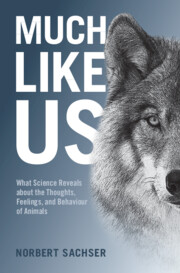Book contents
- Much Like Us
- Much Like Us
- Copyright page
- Dedication
- Contents
- Preface
- Chapter 1 Typical Human, Typical Animal?
- Chapter 2 Ginger Boris Doesn’t Like to Be Alone
- Chapter 3 Cats Are Happy When They’re Playing
- Chapter 4 Nature Versus Nurture
- Chapter 5 Clever Dogs and Ingenious Ravens
- Chapter 6 Animal Personalities
- Chapter 7 Altruistic Squirrels and Egotistical Lions
- Chapter 8 Animals Like Us
- Bibliography
Chapter 1 - Typical Human, Typical Animal?
Reconceptualising the Animal – an Introduction
Published online by Cambridge University Press: 07 April 2022
- Much Like Us
- Much Like Us
- Copyright page
- Dedication
- Contents
- Preface
- Chapter 1 Typical Human, Typical Animal?
- Chapter 2 Ginger Boris Doesn’t Like to Be Alone
- Chapter 3 Cats Are Happy When They’re Playing
- Chapter 4 Nature Versus Nurture
- Chapter 5 Clever Dogs and Ingenious Ravens
- Chapter 6 Animal Personalities
- Chapter 7 Altruistic Squirrels and Egotistical Lions
- Chapter 8 Animals Like Us
- Bibliography
Summary
A revolution has recently taken place in behavioural biology. Its consequences are far-reaching, both for our self-image as humans and for our relationship with animals. Just a few decades ago, behavioural science was guided by two key dogmas: animals cannot think, and no scientific statements can be made about their emotions. Today, the same discipline holds both ideas to be false and posits the very opposite: animals of some species are capable of insight – they can recognise themselves in a mirror and exhibit at least a basic sense of self-awareness – and they have rich emotional lives that seem to be startlingly similar to those of humans. Situations that lead to strong emotional responses in humans, whether positive or negative – for example, when we fall in love or lose a partner – seem to have the same effect on our animal relatives.
- Type
- Chapter
- Information
- Much Like UsWhat Science Reveals about the Thoughts, Feelings, and Behaviour of Animals, pp. 1 - 15Publisher: Cambridge University PressPrint publication year: 2022



